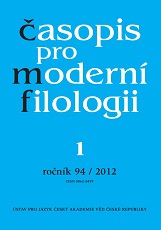Modifikovaná substantivní fráze jako komponent textové výstavby v angličtině a češtině
A Contrastive English-Czech View of Noun Modification as a Component of Text Build-up
Author(s): Libuše DuškováSubject(s): Language and Literature Studies
Published by: AV ČR - Akademie věd České republiky - Ústav pro jazyk český
Keywords: noun modification; premodification; postmodification; realization form; functional sentence perspective; textual role
Summary/Abstract: The paper examines modified noun phrases with respect to the relations between their FSP structure, realization form and textual role. All four FSP structures are dealt with. The configuration with both context-independent components, represented by book titles, shows as the prevalent pattern the modifier in pre-position, which reflects the basic order of adjectivenoun in both languages. In this arrangement the rhematic component, the modifier, precedes the thematic head noun. Within the body of the text, recurrent noun phrases whose modifiers have two realization forms show a tendency to a shift from postmodification at the first occurrence to premodification at further occurrences, thus signalling the context-dependence of the whole noun phrase. The configuration of context-independent modifier and contextdependent head is found where the head noun denotes a textual theme or subtheme, which occurs either with new modifiers or with modifiers disengaged from context-dependence by one of the context-disengaging factors. Here Czech has a specific means, due to its free word order, the postposition of adjectives. Similarly in the case of context-dependent modifier and context-independent head recurrent modifiers are found where they refer to textual themes or subthemes. The influence of the FSP functions of the NP’s components on the realization form of the modifier appears to be only one of the factors involved, the others being the existence of two semantically equivalent realization forms, the basic order adjective – noun, the tendency of academic texts to condensed forms of expression, functional style and possibly others.
Journal: Časopis pro moderní filologii
- Issue Year: 94/2012
- Issue No: 1
- Page Range: 1-17
- Page Count: 17
- Language: Czech

